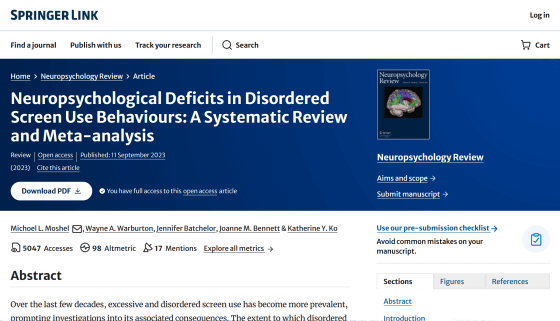Research results show that ``excessive screen viewing'' is associated with decline in cognitive function

Smartphones and PCs have become indispensable in daily life and work, and some people spend most of their day staring at screens. However,
Neuropsychological Deficits in Disordered Screen Use Behaviors: A Systematic Review and Meta-analysis | Neuropsychology Review
https://link.springer.com/article/10.1007/s11065-023-09612-4

Does screen use really impact our thinking skills? Our analysis suggests it could
https://theconversation.com/does-screen-use-really-impact-our-thinking-skills-our-analysis-suggests-it-could-216828
A report published by the University of New South Wales in 2020 ( PDF file) found that 84% of Australian educators believe that digital technology is distracting to students in the learning environment. I did. In addition, according to a survey conducted by Australia's national broadcaster ABC , Australian teachers ranked ``excessive screen time'' as the second most important issue for young people after ``mental health issues.'' Despite this, the majority of schools in Australia allow students to bring their own devices in classrooms where digital devices are required.
A 2021 (PDF file) report by American nonprofit organization Common Sense Media found that children aged 8 to 12 spend an average of 5 hours and 33 minutes per day on screen-based entertainment, while teens aged 13 to 19 spend an average of 5 hours and 33 minutes per day on screen-based entertainment. It was estimated that teenagers spend an average of 8 hours and 39 minutes looking at screens. Due to the rapid increase in screen time, some people, including children, are falling into screen-related addiction.

There is a lot of debate about the impact of increased screen time on people's cognitive functions such as attention, memory, language ability, and problem-solving ability. While some researchers claim that screen use has negative effects such as health problems, reduced attention spans, and developmental delays, schools are increasingly adopting technology to increase student engagement. Technology companies are selling products that claim to improve problem-solving abilities.
Therefore, a research team led by
The research team conducted a meta-analysis of 34 previous studies that investigated gaming, Internet browsing, smartphone and SNS use, and compared the cognitive abilities of those who had problems with screen use and those who did not.
The analysis showed that people with disordered screen-related behaviors had significantly lower cognitive abilities than those without. The most adversely affected cognitive area was attention, and in particular, the ability to maintain sustained attention, which is the ability to stay focused on one thing for a long period of time, was impaired. The second most negatively affected was the executive function that controls thoughts and actions to accomplish complex tasks, and the ability to control automatic reactions was particularly poor. This trend was observed across all age groups and was unaffected by the type of screen activity.

One theory as to why people with disordered screen-related behaviors have lower cognitive performance is that excessive screen time leads to decreased attention and cognitive performance, but further research is needed to establish this causal relationship. . If screen use causes cognitive decline, the root cause may lie in constant bombardment with apps and web services designed by companies to grab your attention. .
Another explanation is that people who already have cognitive decline and have difficulty controlling their impulses are more likely to have disordered screen use. This also suggests that the addictive nature of apps and services designed to keep users glued to their screens may make it difficult to put a brake on screen use. Additionally, people with low attention spans may find it difficult to adapt to less stimulating environments such as workplaces or classrooms, and as a result may be more likely to focus on screens.
In addition, the papers examined by the research team do not support the second explanation, and seem to suggest that disturbances in screen-related behavior cause a decline in cognitive ability.
As users, primarily young adults, suffer from screen-related behavioral disturbances, companies are driven by the desire to grab users' attention a little harder. Moschel and his colleagues argued that it is necessary to encourage open-access data policies from technology companies so that researchers can dig deeper into screen use and its impact on individuals.

Related Posts:
in Science, Posted by log1h_ik







